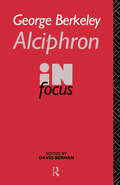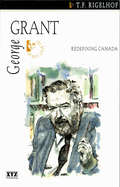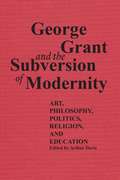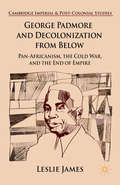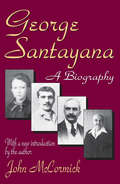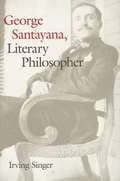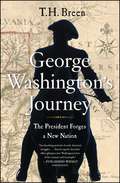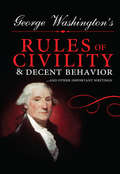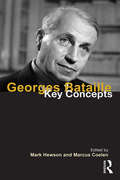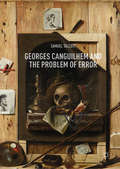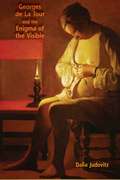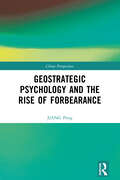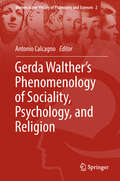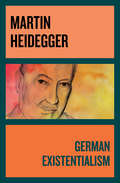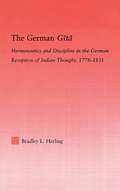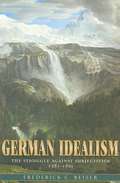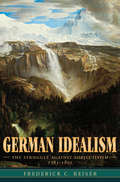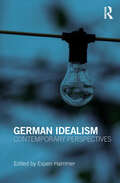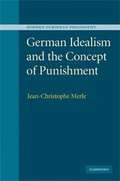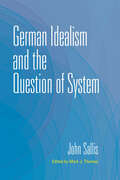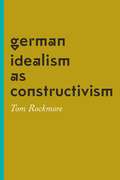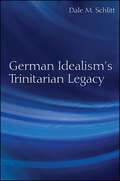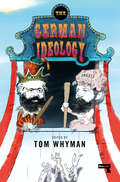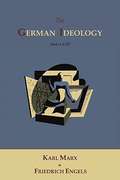- Table View
- List View
George Berkeley Alciphron in Focus (Philosophers in Focus)
by David BermanAlciphron, or the Minute Philosopher (1732) is Berkeley's main work of philosophical theology and a crucial source of his views on meaning and language. This edition contains the four most important dialogues and a selection of critical essays and commentaries reflecting the response of such writers as Hutcheson, Mill and Antony Flew. The only single edition currently in print, it argues that Alciphron has a more important place both in the Berkeley canon and in early modern philosophy than is generally thought.
George Grant
by T. F. RigelhofGeorge Grants Lament for a Nation led some to call him a Red Tory and the dominant force behind the Canadian nationalist movement of the 1970s. Today, reading George Grants books helps us to understand the full implications of American-led, technology-driven globalization on everyday life.
George Grant and the Subversion of Modernity: Art, Philosophy, Religion, Politics and Education (The Royal Society of Canada Special Publications)
by Arthur DavisGeorge Grant's mystique as a public philosopher is due in part to the seemingly contradictory political stances he took through the years. His opposition to the Vietnam war and his linking of liberalism with technological progress and imperialism brought him favour among the political left during the 1960s. Then, in the following decade, his opposition to abortion earned him allies on the political right, despite his rejection of limitless capitalist growth and free trade with the US. This collection of original essays reveals the complex philosophic, artistic, and religious sources underlying Grant's public positions of nationalism, pacifism, and conservatism.The collection begins with Grant's previously unpublished writing on Céline. This is a bold and vigorous Grant, writing on a topic about which he is passionate and deeply informed. Grant's own work is followed by two pieces that explore his devotion to Céline, Nietzsche, Heidegger, Weil, and Strauss also receive special attention here. Many of the essays draw on manuscripts and notes left unpublished by Grant, thus contributing new perspectives to the ongoing discussion of his work.The focus of this book is the unknown George Grant, namely, the philosophic, religious, and artistic inspiration behind his well-known public positions. Here we discover the great modern thinkers who animated Grant, and whose writings occupied him for much of his life.
George Padmore and Decolonization from Below: Pan-Africanism, the Cold War, and the End of Empire (Cambridge Imperial and Post-Colonial Studies Series)
by L. JamesThis book argues that the rising tide of anti-colonialism after the 1930s should be considered a turning point not just in harnessing a new mood or feeling of unity, but primarily as one that viewed empire, racism, and economic degradation as part of a system that fundamentally required the application of strategy to their destruction.
George Santayana: A Biography (Works Of George Santayana Ser.)
by John McCormickFrom the late nineteenth century to the middle of the twentieth, George Santayana was a highly esteemed and widely read writer of philosophy, poetry, essays, memoirs, and even a best-selling novel, The Last Puritan. After a period of relative neglect, interest in his work has revived. A complete edited edition of his works is in progress and he has become the object of renewed scholarly activity. Contributing significantly to the renewal was John McCormick's 1987 biography, the first full-scale volume to treat an elusive figure's life and thought in the detail they deserve.Santayana's life was rich in its interior and outer associations. There was his birth and early childhood in Spain followed by a move to Boston, where he came under the influence of William James at Harvard. This led to his career at Harvard as a professor, where Wallace Stevens, Robert Frost, Conrad Aiken, Franklin D. Roosevelt, and Walter Lippmann were among his devoted students. We see Santayana in correspondence and conversation with Bertrand Russell, G.E. Moore, Ezra Pound, and Robert Lowell.Predominant in Santayana's life was his philosophical work. Hostile to the dominant empiricism of Anglo-American philosophy, he left the academy and remained detached from both the political and ideological movements of early decades of the twentieth century. McCormick relates his skepticism and materialism to a form of idealism deriving from his classical education in Plato and Aristotle, together with his readings in Descartes and Spinoza. He presents Santayana as a supreme stylist in English, who lived a long life always consistent with his stoic epicureanism.
George Santayana: Literary Philosopher
by Irving SingerGeorge Santayana was unique in his contribution to American culture. For almost sixty years before his death in 1952, he combined literary and philosophical talents, writing not only important works of philosophy but also a best-selling novel, volumes of poetry, and much literary criticism. In this fascinating portrait of Santayana's thought and complex personality, Irving Singer explores the full range of his harmonization of the literary and the philosophical. Singer shows how Santayana's genius consisted in his imaginative ability to turn various types of personal alienation into creative elements that recur throughout his books. Singer points out that Santayana was a professional philosopher who addressed immediate problems of existence, a materialist in philosophy who believed in both a life of spirit and a life of reason, a product of American pragmatism who nevertheless rebelled against it, a Spaniard who wrote only in English, an American author who spent the last forty years of his lift in different European countries. Against the grain of most twentieth-century philosophy, Santayana kept in view questions that matter to us all in our search for meaningful and satisfying lives.
George Washington's Journey
by T. H. BreenThis is George Washington in the surprising role of political strategist.T.H. Breen introduces us to a George Washington we rarely meet. During his first term as president, he decided that the only way to fulfill the Revolution was to take the new federal government directly to the people. He organized an extraordinary journey carrying him to all thirteen states. It transformed American political culture. For Washington, the stakes were high. If the nation fragmented, as it had almost done after the war, it could never become the strong, independent nation for which he had fought. In scores of communities, he communicated a powerful and enduring message--that America was now a nation, not a loose collection of states. And the people responded to his invitation in ways that he could never have predicted.s us on these journeys. We see the country through Washington's eyes and listen through his ears. We understand why George Washington is the indispensable Founding Father.
George Washington's Rules of Civility & Decent Behavior
by George Washington"Labour to keep alive in your breast that little celestial fire called conscience. ""Run not in the streets. . . nor with mouth open; go not upon the toes nor in a dancing fashion. "George Washington was known as a remarkably modest and courteous man. Humility and flawless manners were so ingrained in his character that he rarely if ever acted without them. The "Rules of Civility and Decent Behavior" that governed Washington's etiquette were by turns practical, inspirational and curious. These rules are as instructive and invaluable today as they were hundreds of years ago. George Washington's Rules of Civility and Decent Behavior includes the complete text of the rules, as well as famous Washington writings such as:-Farewell to the Armies speech-Inaugural Address-Retirement Address-Address at the End of His Presidency
Georges Bataille: Key Concepts (Key Concepts)
by Mark Hewson Marcus CoelenGeorges Bataille (1897 - 1962) was a philosopher, writer, and literary critic whose work has had a significant impact across disciplines as diverse as philosophy, sociology, economics, art history and literary criticism, as well as influencing key figures in post-modernist and post-structuralist philosophy such as Jacques Derrida and Michel Foucault. In recent years, the number of works published on Georges Bataille, as well as the variety of contexts in which his work is invoked, has markedly increased. In Georges Bataille: Key Concepts an international team of contributors provide an accessible introduction to and survey of Bataille's thought. The editors’ introduction provides an overview of Bataille’s work, while the chapters in the first section cover the social, political, artistic and philosophical contexts that shaped his thought. In the second part, each chapter engages with a key theme in Bataille’s philosophy, including: art, eroticism, evil, inner experience, heterology, religion, sacrifice, and sovereignty. The final chapter addresses Bataille’s literary writings. Georges Bataille: Key Concepts is an invaluable guide for students from across the Humanities and Social Sciences, coming to Bataille’s work for the first time. Contributors: Giulia Agostini, Elisabeth Arnould-Bloomfield, Tiina Arppe, Marcus Coelen, Simonetta Falasca-Zamponi, Patrick ffrench, Marina Galletti, Nadine Hartmann, Mark Hewson, Andrew Hussey, Stuart Kendall, Claire Nioche, Gerhard Poppenberg, and Michèle Richman.
Georges Canguilhem and the Problem of Error
by Samuel TalcottExamining Georges Canguilhem’s enduring attention to the problem of error, from his early writings to Michel Foucault’s first major responses to his work, this pathbreaking book shows that the historian of science was also a centrally important philosopher in postwar France. Samuel Talcott elucidates Canguilhem’s contributions by drawing on previously neglected publications and archival sources to trace the continuity of commitment that led him to alter his early anti-vitalist, pacifist positions in the face of political catastrophe and concrete human problems. Talcott shows how Canguilhem critically appropriated the philosophical work of Alain, Bergson, Bachelard, and many others while developing his own distinct writings on medicine, experimentation, and scientific concepts in an ethical and political endeavor to resist alienation and injustice. And, while suggesting Canguilhem’s sometimes surprising philosophical importance for a range of younger thinkers, the book demonstrates Foucault’s own critical allegiance to Canguilhem’s spirit, techniques, and investigations.
Georges de La Tour and the Enigma of the Visible
by Dalia JudovitzNot rediscovered until the twentieth century, the works of Georges de La Tour retain an aura of mystery. At first sight, his paintings suggest a veritable celebration of light and the visible world, but this is deceptive. The familiarity of visual experience blinds the beholder to a deeper understanding of the meanings associated with vision and the visible in the early modern period. By exploring the representations of light, vision, and the visible in La Tour’s works, this interdisciplinary study examines the nature of painting and its artistic, religious, and philosophical implications. In the wake of iconoclastic outbreaks and consequent Catholic call for the revitalization of religious imagery, La Tour paints familiar objects of visible reality that also serve as emblems of an invisible, spiritual reality. Like the books in his paintings, asking to be read, La Tour’s paintings ask not just to be seen as visual depictions but to be deciphered as instruments of insight. In figuring faith as spiritual passion and illumination, La Tour’s paintings test the bounds of the pictorial image, attempting to depict what painting cannot ultimately show: words, hearing, time, movement, changes of heart. La Tour’s emphasis on spiritual insight opens up broader artistic, philosophical, and conceptual reflections on the conditions of possibility of the pictorial medium. By scrutinizing what is seen and how, and by questioning the position of the beholder, his works revitalize critical discussion of the nature of painting and its engagements with the visible world.
Geostrategic Psychology and the Rise of Forbearance (China Perspectives)
by JIANG PengBased on the framework of geostrategic psychology, this book elucidates the intrinsic law of the rise and fall of great powers and gives insights into the quandary of China's rise and the mechanism behind the strategy.Conflating geopolitics and strategic psychology, geostrategic psychology is rooted in the historical study of strategy and premised on an assumption that human beings bear resemblance in psychology and behavior when facing the same structure of geopolitical circumstance. The book analyzes intriguing phenomena from strategic psychology, including trend anxiety and conflict willingness, the Old Man Phenomenon in international politics, the Santa Claus Effect, the Myth of the Sunk Cost Fallacy, Bidder Myth, Gambler's Game, Philip Trap, William's Dilemma, Heartland Myth, Domino's Fear, Golden Nation Myth, Alliance Commitment Dilemma and Corinthian Dilemma among others. The author combines theory, history and the practice of international politics, revealing how a nation can occupy a favorable position in the field of global strategic competition and prospects for China.The title will be a valuable reference for observers of international politics as well as researchers and students interested in international relations, international politics, geopolitics, strategic psychology and geostrategic psychology.
Gerda Walther’s Phenomenology of Sociality, Psychology, and Religion (Women in the History of Philosophy and Sciences #2)
by Antonio CalcagnoThis book explores the philosophical writings of Gerda Walther (1897–1977). It features essays thatrecover large parts of Walther’s oeuvre in order to show her contribution to phenomenologyand philosophy. In addition, the volume contains an English translation of part of hermajor work on mysticism.The essays consider the interdisciplinary implications of Gerda Walther’s ideas. A student of Edmund Husserl, Edith Stein, and Alexander Pfänder, she wrotefoundational studies on the ego, community, mysticism and religion, and consciousness.Her discussions of empathy, identification, the ego and ego-consciousness,alterity, God, mysticism, sensation, intentionality, sociality, politics, and woman arerelevant not only to phenomenology and philosophy but also to scholars of religion, women’s and gender studies, sociology, political science, and psychology.Gerda Walther was one of the important figures of the early phenomenologicalmovement. However, as a woman, she could not habilitate at a Germanuniversity and was, therefore, denied a position. Her complete works have yet to bepublished. This ground-breaking volume not only helps readers discover a vital voice but it also demonstrates the significant contributions of women to early phenomenological thinking.
German Existentialism
by Martin HeideggerThese pro-Nazi speeches by the author Being and Time are collected here to demonstrate the truly dark and shameful turn taken by the eminent philosopher. &“On the day of German Labor, on the day of the Community of the People, the Rector of Freiburg University, Dr. Martin Heidegger, made his official entry into the National Socialist Party.&” And so begins one of the most controversial texts available today. Heidegger, a German Nationalist and proud Nazi, thoroughly examines the history, the philosophy, and the rise to power of the Nazi movement in Germany. Martin Heidegger&’s distinguished Italian colleague, Professor Benedetto Croce, said of his German contemporary, &“This man dishonors philosophy and that is an evil for politics too.&” Croce&’s severe rebuke was not singular at the time when Hitlerism was rampant over Europe. It is true that among the almost one thousand professional philosophers of Germany and Austria only very few actively opposed National Socialism. On the other hand, no one degraded his history profession in the way that Heidegger did, by becoming a spokesman for National socialism and attempting to mold his theories into one pattern with Hitlerism.
The German Gita: Hermeneutics and Discipline in the Early German Reception of Indian Thought
by Bradley L. HerlingHow did the Bhagavadgãtà first become an object of German philosophical and philological inquiry? How were its foundational concepts initially interpreted within German intellectual circles, and what does this episode in the history of cross-cultural encounter teach us about the status of comparative philosophy today? This book addresses these questions through a careful study of the figures who read, translated and interpreted the Bhagavadgãtà around the turn of the nineteenth century in Germany: J.G. Herder, F. Majer, F. Schlegel, A.W. Schlegel, W. von Humboldt, and G.W.F. Hegel. Methodologically, the study attends to the intellectual contexts and prejudices that framed the early reception of the text. But it also delves deeper by investigating the way these frameworks inflected the construction of the Bhagavadgãtà and its foundational concepts through the scholarly acts of excerpting, anthologization, and translation. Overall, the project contributes to the pluralization of Western philosophy and its history while simultaneously arguing for a continued critical alertness in cross-cultural comparison of philosophical and religious worldviews.
German Idealism: The Struggle against Subjectivism 1781-1801
by Frederick C. BeiserThis work advances and revises our understanding of both the history and the thought of the classical period of German philosophy.
German Idealism
by Frederick C. BeiserOne of the very few accounts in English of German idealism, this ambitious work advances and revises our understanding of both the history and the thought of the classical period of German philosophy. As he traces the structure and evolution of idealism as a doctrine, Frederick Beiser exposes a strong objective, or realist, strain running from Kant to Hegel and identifies the crucial role of the early romantics--Hölderlin, Schlegel, and Novalis--as the founders of absolute idealism. Traditionally, German idealism is understood as a radical form of subjectivism that expands the powers of the self to encompass the entire world. But Beiser reveals a different--in fact, opposite--impulse: an attempt to limit the powers of the subject. Between Kant and Hegel he finds a movement away from cosmic subjectivity and toward greater realism and naturalism, with one form of idealism succeeding another as each proved an inadequate basis for explaining the reality of the external world and the place of the self in nature. Thus German idealism emerges here not as a radical development of the Cartesian tradition of philosophy, but as the first important break with that tradition.Table of Contents: Introduction 1. Realism in German Idealism 2. Exorcising the Spirit 3. The Critique of Foundationalism 4. The Troublesome Hegelian Legacy 5. The Taxonomy of German Idealism I. KANT'S CRITIQUE OF IDEALISM Introduction: Kant and the Problem of Subjectivism 1. The Clash of Interpretations 2. Method and Results 3. Contemporary Kant Scholarship 1. Idealism in the Precritical Years 1. The Idealist Challenge 2. The First Refutation of Idealism 3. Idealist Dreams and Visions 4. The Critique of Idealism in the Inaugural Dissertation 5. Skeptical Ambivalence 6. David Hume, Transcendental Realist 2. Transcendental Idealism and Empirical Realism 1. The Case for Subjectivism 2. The First Edition Definitions of Transcendental Idealism 3. Transcendental versus Empirical Idealism 4. Empirical Realism in the Aesthetic 5. Empirical Realism and Empirical Dualism 3. The First Edition Refutation of Skeptical Idealism 1. The Priority of Skeptical Idealism 2. The Critique of the Fourth Paralogism 3. The Proof of the External World 4. A Cartesian Reply 5. Appearances and Spatiality 6. The Ambiguity of Transcendental Idealism 7. The Coherence of Transcendental Idealism 4. The First Edition Refutation of Dogmatic Idealism 1. The Missing Refutation 2. Kant's Interpretation of Leibniz 3. The Dispute in the Aesthetic 4. Dogmatic Idealism in the Antinomies 5. Kant and Berkeley 1. The Göttingen Review 2. Kant's Reaction 3. Berkeleyianism in the First Edition of the Kritik 4. The Argument of the Prolegomena 5. Kant's Interpretation of Berkeley 6. The Small but Real Differences? 6. The Second Edition Refutation of Problematic Idealism 1. The Problem of Interpretation 2. Kant's Motives 3. The Question of Kant's Realism 4. Realism in the Refutation 5. The New Strategy 6. The Argument of the Refutation 7. Outer vis-à-vis Inner Sense 8. Kant's Refutations in the Reflexionen, 1788-93 7. Kant and the Way of Ideas 1. The Theory of Ideas 2. Loyalty and Apostasy 3. The Transcendental versus the Subjective 4. The Question of Consistency 5. The Doctrine of Inner Sense 6. Kantian Self-Knowledge and the Cartesian Tradition 8. The Transcendental Subject 1. Persistent Subjectivism 2. Eliminating the Transcendental Subject 3. The Criteria of Subjectivity 4. The Subjectivity of the Transcendental 5. Restoring the Transcendental Subject 9. The Status of the Transcendental 1. The Problematic Status of the Categories 2. The Metaphysial Interpretation 3. The Psychological Interpretation 4. The Logical Interpretation 5. The Ineliminable Psychological Dimension 6. Problems of Transcendental Psychology 7. Transcendental Psychology and Transcendental Idealism 10. Kant's Idealism in the Opus postumum 1. Kant's Peruke 2. The Gap in the Critical System 3. The Transition Program and Its Implications 4. The Transition and Refutation 5. The Selbstsetzungslehre 6. Appearance of Appe...
German Idealism: Contemporary Perspectives
by Espen HammerThis outstanding collection of specially commissioned chapters examines German idealism from several angles and assesses the renewed interest in the subject from a wide range of fields. Including discussions of the key representatives of German idealism such as Kant, Fichte and Hegel, it is structured in clear sections dealing with: metaphysics the legacy of Hegel’s philosophy Brandom and Hegel recognition and agency autonomy and nature the philosophy of German romanticism. Amongst other important topics, German Idealism: Historical and Philosophical Perspectives addresses the debates surrounding the metaphysical and epistemological legacy of German idealism; its importance for understanding recent debates in moral and political thought; its appropriation in recent theories of language and the relationship between mind and world; and how German idealism affected subsequent movements such as romanticism, pragmatism, and critical theory. Contributors: Espen Hammer, Stephen Houlgate, Sebastian Gardner, Paul Redding, Andrew Bowie, Richard Eldridge, Jay Bernstein, Frederick Beiser, Paul Franks, Robert Pippin, Fred Rush, Manfred Frank, Terry Pinkard, Robert Stern
German Idealism and the Concept of Punishment
by Joseph J. Kominkiewicz Frances BrownAgainst the background of early modernism - a period that justified punishment by general deterrence - Kant is usually thought to represent a radical turn towards retributivism. For Kant, and later for Fichte and Hegel, a just punishment respects the humanity inherent in the criminal, and serves no external ends - it is instituted only because the criminal deserves it. In this original study, Jean-Christophe Merle uses close analysis of texts to show that these philosophers did not in fact hold a retributivist position, or even a mixed position; instead he traces in their work the gradual emergence of views in favour of deterrence and resocialisation. He also examines Nietzsche's view that morality rests on the rejection of retribution. His final chapter offers a challenge to the retributivist position, and a defence of resocialisation, in the context of current legal theory and practice concerning the punishment of crimes against humanity.
German Idealism and the Jew: The Inner Anti-Semitism of Philosophy and German Jewish Responses
by Michael MackIn German Idealism and the Jew, Michael Mack uncovers the deep roots of anti-Semitism in the German philosophical tradition. While many have read German anti-Semitism as a reaction against Enlightenment philosophy, Mack instead contends that the redefinition of the Jews as irrational, oriental Others forms the very cornerstone of German idealism, including Kant's conception of universal reason. Offering the first analytical account of the connection between anti-Semitism and philosophy, Mack begins his exploration by showing how the fundamental thinkers in the German idealist tradition—Kant, Hegel, and, through them, Feuerbach and Wagner—argued that the human world should perform and enact the promises held out by a conception of an otherworldly heaven. But their respective philosophies all ran aground on the belief that the worldly proved incapable of transforming itself into this otherworldly ideal. To reconcile this incommensurability, Mack argues, philosophers created a construction of Jews as symbolic of the "worldliness" that hindered the development of a body politic and that served as a foil to Kantian autonomy and rationality. In the second part, Mack examines how Moses Mendelssohn, Heinrich Heine, Franz Rosenzweig, and Freud, among others, grappled with being both German and Jewish. Each thinker accepted the philosophies of Kant and Hegel, in varying degrees, while simultaneously critiquing anti-Semitism in order to develop the modern Jewish notion of what it meant to be enlightened—a concept that differed substantially from that of Kant, Hegel, Feuerbach, and Wagner. By speaking the unspoken in German philosophy, this book profoundly reshapes our understanding of it.
German Idealism and the Question of System (The Collected Writings of John Sallis)
by John SallisThis volume in the Collected Writings of John Sallis presents his lecture course on German Idealism, tracing its development from the reception of Kant through the works of Fichte and Schelling. With insightful interpretations of key texts, John Sallis demonstrates the enduring power of post-Kantian thought—especially with respect to freedom, the relation of subject to object, and the role of the imagination. He shows that what underlies the development of German Idealism is a concern with the question of system and the nature of philosophy itself.The book begins with a treatment of Kant's philosophy and its new beginning. It then discusses the initial reception of Kant's philosophy, showing how criticisms of Kant set the stage for the subsequent development of German Idealism. The central chapters focus on Fichte, first introducing his central philosophical project (the Wissenschaftslehre) and then carefully analyzing its implementation in the 1794 Grundlage. The final chapters treat Schelling's early and middle philosophy, including the 1800 System of Transcendental Idealism and his famous 1809 treatise on freedom.Beyond its insights into the thought of German Idealism, the book is distinctive for the clarity of Sallis's exposition, his attention to the implications for philosophy today, and the sense of wonder he evokes in his readers. Because of these features, the book will be of interest to general readers as well as specialists in German philosophy.
German Idealism as Constructivism
by Tom RockmoreGerman Idealism as Constructivism is the culmination of many years of research by distinguished philosopher Tom Rockmore--it is his definitive statement on the debate about German idealism between proponents of representationalism and those of constructivism that still plagues our grasp of the history of German idealism and the whole epistemological project today. Rockmore argues that German idealism--which includes iconic thinkers such as Kant, Fichte, Schelling, and Hegel--can best be understood as a constructivist project, one that asserts that we cannot know the mind-independent world as it is but only our own mental construction of it. Since ancient Greece philosophers have tried to know the world in itself, an effort that Kant believed had failed. His alternative strategy--which came to be known as the Copernican revolution--was that the world as we experience and know it depends on the mind. Rockmore shows that this project was central to Kant's critical philosophy and the later German idealists who would follow him. He traces the different ways philosophers like Fichte, Schelling, and Hegel formulated their own versions of constructivism. Offering a sweeping but deeply attuned analysis of a crucial part of the legacy of German idealism, Rockmore reinvigorates this school of philosophy and opens up promising new avenues for its study.
German Idealism's Trinitarian Legacy
by Dale M. SchlittDale M. Schlitt presents a study of trinitarian thought as it was understood and debated by the German Idealists broadly—engaging Schelling's philosophical interpretations of Trinity as well as Hegel's—and analyzing how these Idealist interpretations influenced later philosophers and theologians. Divided into different sections, one considers nineteenth-century central Europeans Philipp Marheineke, Isaak August Dorner, and Vladimir Sergeyevich Solovyov under the rubric "testimonials." Another section studies twentieth-century Germans Karl Barth, Karl Rahner, and Wolfhart Pannenberg, who share "family resemblances" with the Idealists, and a third addresses the work of twentieth- and twenty-first century Americans, Robert W. Jenson, Catherine Mowry LaCugna, Joseph A. Bracken, and Schlitt himself, whose work reverberates with what Schlitt terms "transatlantic Idealist echoes." The book concludes with reflection on the overall German Idealist trinitarian legacy, noting several challenges it offers to those who will pursue creative trinitarian reflection in the future.
The German Ideology: A New Abridgement
by Karl MarxA new abridgement of Marx and Engels&’s 1846 reckoning with the philosophical tradition, edited and with an introduction by philosopher Tom Whyman.Edited and with an introduction by philosopher Tom Whyman, this new abridged version The German Ideology sheds new light on one of the most difficult, disputed texts in Marx&’s oeuvre.Written in 1846 and subsequently abandoned by Marx and Engels, only to be rescued in the 1930s by researchers in the USSR, The German Ideology is the high point of Marx&’s philosophical thought: a brilliantly insightful, still thrillingly radical work of materialist philosophical therapy. Yet there remains no wholly satisfactory stand-alone version in English, with only a heavily abridged 1970 edition edited by C.J. Arthur, or a facsimile edition taken from Vol. 5 of the Marx-Engels Collected Works, which does not include satisfactory scholarly notes, currently available. In this new Repeater Classics edition, Tom Whyman seeks to remedy this. By expanding on generally-available abridgements to include the bulk of the section on Max Stirner, as well as amending the translation, adding notes and providing a new critical introduction, this new edition of The German Ideology will allow non-specialists to engage with this critical work for the first time. At a time when interest in Marx's work is increasing, as people look for an alternative to our currently failing political system, this new edition of The German Ideology will bring Marx's most substantial vision of what communism might actually be like to a whole new audience.
The German Ideology
by Karl Marx Friedrich Engels2011 Reprint of 1939 Edition. Parts I & III of "The German Ideology". Full facsimile of the original edition, not reproduced with Optical Recognition Software. Originally published by the Marx-Engels Institute in Moscow in 1939. "The German Ideology" was written by Karl Marx and Friedrich Engels circa 1846, but published later. The original edition was divided into three parts. Part I, the most significant, is perhaps the classic statement of the Marxist theory of history and his much cited "materialist conception of history". Since its first publication, Marxist scholars have found Part I "The German Ideology" particularly valuable since it is perhaps the most comprehensive statement of Marx's theory of history stated at such length and detail. Part II consisted of many satirically written polemics against Bruno Bauer, other Young Hegelians, and Max Stirner. These polemical and highly partisan sections of the "German Ideology" have not been reproduced in this edition. We reprint Parts I & Parts III only. Part III treats Marx & Engels' conception of true socialism and is reprinted in its entirety. Part II has not been reprinted in this edition in order to produce a small and inexpensive book which contains the gist of the "German Ideology". Appendix contains the "Theses on Feuerbach." Index of authors, with scholarly citations and footnotes.
